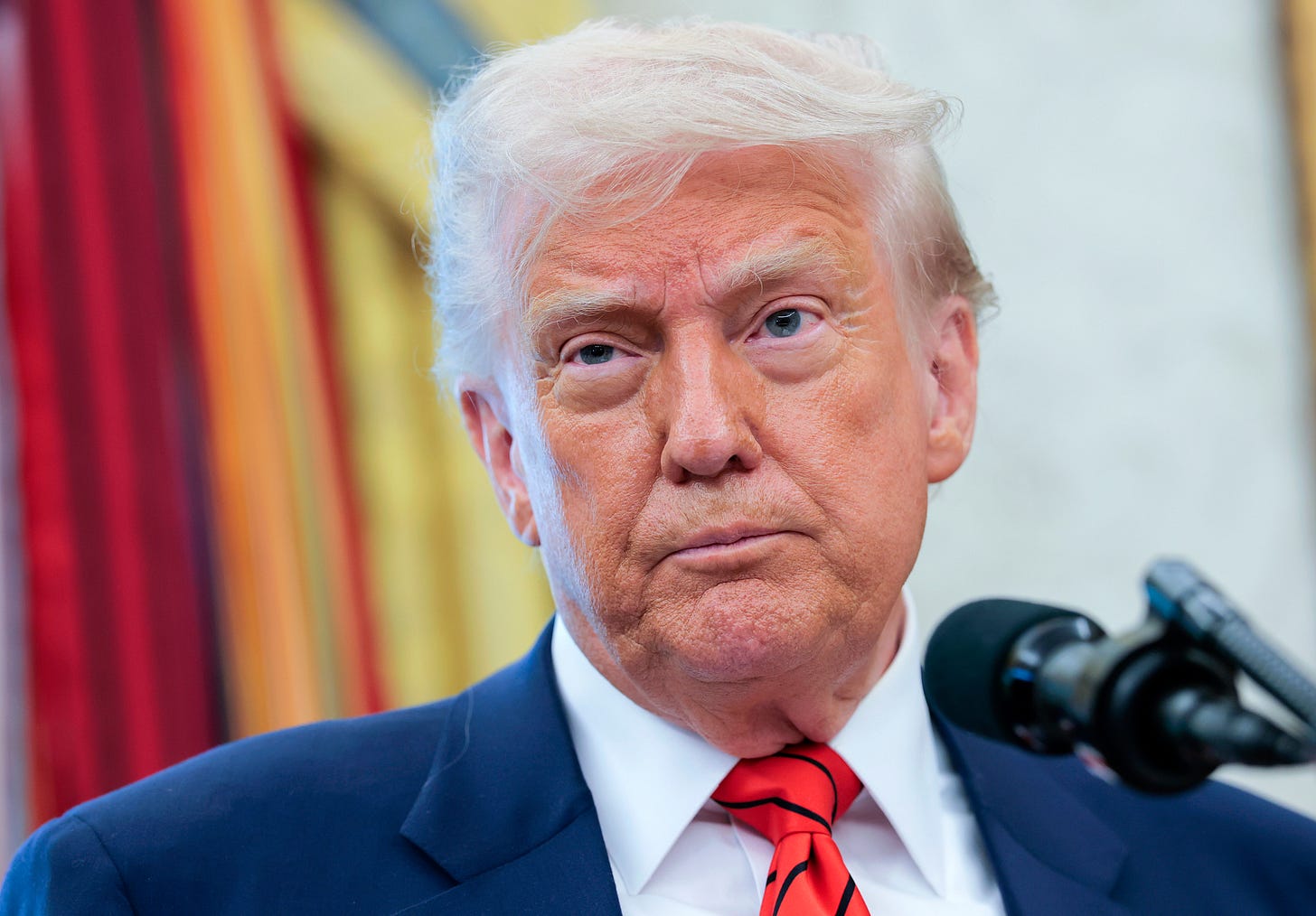
New SDS Stands in Solidarity with the Rutgers 4
May 7, 2025
The Price of Remission
May 8, 2025AS THE TRUMP ADMINISTRATION CONTINUES its assault on political, legal, and ethical norms across large swaths of the federal government, state courtrooms, private businesses, educational institutions, and even the lives of individuals, the Republican-led Congress has wrongly ceded much of its constitutional authority—including the power to impose tariffs and rescind authorized appropriations—to the White House. Crucial checks on the executive inherent in the separation of powers have thereby disappeared. Nevertheless, the administration has run into both popular and judicial roadblocks—to say nothing of how it has repeatedly gotten its own way—while attempting to impose its will on the federal government and the nation.
While its aggressive tactics likely mask internal disorganization—such is the norm in personality-driven regimes; making the boss happy is far more effective than any appeal to principle or ideology—their actions are no less real or consequential for it. Opposition therefore remains crucially important. When the federal government takes action in spheres in which the executive has considerable unilateral power, as with the termination of jobs and the revocation of student visas, recourse is limited. But most private citizens or entities that become targets of the administration are on stronger footing, and they should fight back as publicly as possible, because when the administration comes for them, it often must stretch beyond its legal and even political capacities.
For example, the Associated Press successfully sued the government after the administration barred AP reporters from White House functions in response to the wire service’s refusal to call the Gulf of Mexico the “Gulf of America.” (The Trump team has since learned they can skirt enforcement by not openly admitting that their actions have motivations that violate the First Amendment.)
It’s essential for organizations similarly targeted to avoid trying to go it alone. But by going after individual people and institutions, the Trump administration creates a collective action problem. As Gregory L. Poe observed in the case of the law firms Trump targeted with executive orders, each firm sought to protect its own interests by cutting a deal, and in doing so, they made themselves all more vulnerable. In late April, the administration announced a new executive order that, among other things, assigns the many law firms that signed deals with the administration to defend, pro bono, police officers against liability for unjustified violence. For Trump, l’appétit vient a mangeant—his appetite grows as he eats. That is why the large-scale resistance the Trump administration is already facing is so encouraging and so important: It is in this way that he might be starved.
TRUMP’S THREATS AREN’T ALL equally serious. Some of his pronouncements suggest actions he wishes to take that are outside the powers of the federal government to do, though even these sorts of remarks can intimidate private individuals and companies, universities, and other organizations into following the administration’s lead. Some states have also lined up to impose their own versions of MAGA via legislation and state directives to law enforcement. And even in his private capacity, Trump’s actions as an individual are backed by the implicit power of the federal government. Hence the overgenerous settlement of his lawsuit against ABC and his likely payday from his frivolous lawsuit against CBS/Paramount.
When the administration claims a power without the force of law, the law remains available to those who would resist. Case in point: Trump issued an executive order to force states to take specific steps to prove citizenship to vote in federal elections even though the Constitution gives the power of setting terms for federal elections to Congress and leaves the regulation of those elections to states. The order has already been partially blocked in court for exceeding executive authority. To take another example, Judge Beryl Howell struck down Trump’s executive order targeting the law firm Perkins Coie, which, unlike so many of their competitors, chose to fight the administration in court.
What’s more, because these fights are maximally public, significant downstream effects will result from today’s acts of resistance or capitulation. This is already becoming clear in the world of Big Law, whose mixed response to the administration’s hostilities hasn’t gone unnoticed by aspiring lawyers. Three Georgetown law students put together a working list of law firms to track the extent to which they have cooperated with the administration. Adam Klasfeld reported that “the Google spreadsheet currently names more than 800 firms, assigning them to one of five stark categories: ‘Caved to Administration,’ ‘Complying in Advance,’ ‘Other Negative Action,’ ‘Stood Up Against Administration’s Attacks,’ or ‘No Response.’”
Georgetown’s faculty and leadership have been as resolute as their students. The law school’s dean, William Treanor, responded tersely to a letter sent by U.S. Attorney for the District of Columbia Ed Martin, who demanded that the school—which is private—cease all diversity, equity, and inclusion initiatives lest its graduates be disqualified from being hired by his office. Above the Law summarized Treanor’s measured and professional response to the interim U.S. attorney: “F all the way off.” Catty comments aside, this is precisely how institutions should react to the administration’s bullying. If any institution is prepared to fight the administration, it’s a private, well-funded, religiously affiliated group of sophisticated lawyers.
Other American universities have had a mixed record dealing with Trump attacks. Columbia was first to surrender to egregious demands about staffing and curricula over several hundred million dollars in threatened funding. Harvard, however, faces revocation of more than $2 billion in grants and is resisting anyway. The administration reacted to Harvard’s resistance by claiming the threatening letter was sent by mistake, then by threatening to cancel Harvard’s tax-exempt status, then by blocking the university from access to new federal research money—which the administration is busily slashing anyway.
To be sure, not everyone or every institution that stands up to the administration will win or face no serious consequences. A few weeks after faculty at Indiana University voted to join a bloc of Big Ten schools to cooperate against future political attacks, the Republican-controlled Indiana legislature sneaked a rider into the budget that effectively stripped tenure from IU professors and gave the state’s enthusiastic MAGA governor, Mike Braun. the power to replace IU’s board of trustees, which has been elected by alumni for over a century.
Harvard is likely to fight all the administration’s retributive actions in court. It may win. Perhaps the precedents it sets will help IU maintain some of its traditional independence, as well. Either way, IU will be no worse off for Harvard having fought back. But everyone would be worse off if no one fought back.
THE SAME PATTERN APPLIES TO INDIVIDUALS who are targets of the administration.
Trump issued an executive order targeting Chris Krebs, director of the Cybersecurity and Infrastructure Security Agency during the first Trump term, for denying that the 2020 election was stolen. The president ordered DOJ and DHS to investigate Krebs’s employer, SentinelOne. Krebs resigned immediately from the company following the order, underscoring the personal and financial costs of political courage.
The power of federal prosecutors is hard to exaggerate. As then-attorney general and later Supreme Court Justice Robert Jackson told an assembly of U.S. attorneys in 1940:
The prosecutor has more control over life, liberty, and reputation than any other person in America. His discretion is tremendous. He can have citizens investigated and, if he is that kind of person, he can have this done to the tune of public statements and veiled or unveiled intimations. Or the prosecutor may choose a more subtle course and simply have a citizen’s friends interviewed. The prosecutor can order arrests, present cases to the grand jury in secret session, and on the basis of his one-sided presentation of the facts, can cause the citizen to be indicted and held for trial. He may dismiss the case before trial, in which case the defense never has a chance to be heard. Or he may go on with a public trial. If he obtains a conviction, the prosecutor can still make recommendations as to sentence, as to whether the prisoner should get probation or a suspended sentence, and after he is put away, as to whether he is a fit subject for parole. While the prosecutor at his best is one of the most beneficent forces in our society, when he acts from malice or other base motives, he is one of the worst.
All of these powers remain, and in some respects have increased in the eighty-five years since Jackson made those remarks. The FBI’s arrest of a Milwaukee County judge is the latest effort to chill those who stand up to the administration. The judge has retained conservative superlawyer and former solicitor general Paul Clement on her legal team, suggesting a serious fight into the appellate level if necessary. Not everyone has the connections or resources to hire legal representation, but those who can do so must. There are too many local judges for the FBI to arrest them all, especially if the very first one gets the best legal team imaginable.
It is daunting to contemplate Trump’s legal and political onslaught for the next several years, but that should not dissuade us from resisting. Notably, Trump’s DOJ has been antagonizing judges appointed by both parties, leading to loss after loss in federal court. Indeed, some of the highest-profile rebukes have come from jurists with stellar reputations within the conservative legal movement. While various legal, media, and academic institutions have caved to Trump’s pressure, the federal bench has largely held its ground. The courts won’t save us outright, but they may prevent the administration from enjoying every advantage in conducting its legal hostilities.
And there are signs that other American institutions are discovering that standing up to the Trump administration can be safe. Microsoft recently switched its legal representation in a major case in Delaware from Simpson Thacher & Bartlett, a firm that had cut a deal with the Trump administration, to Jenner & Block, which did not.
In these and other instances, particularly against private citizens and institutions, Trump’s greatest weapon is not the true force of law but reluctance of his opponents to fight back. As the political and economic consequences of the administration’s policies become clearer to more Americans and the administration grows more desperate for victories, the number of their targets will increase. But that is likely to make their attacks less potent, not more. Consider that whichever side in any confrontation has the greater number of targets is the one we would describe as being “outnumbered.”
We would all be better off—individually and collectively—if everyone who is able resolves to fight back.
Great Job Jonathan Blanks & the Team @ The Bulwark Source link for sharing this story.






